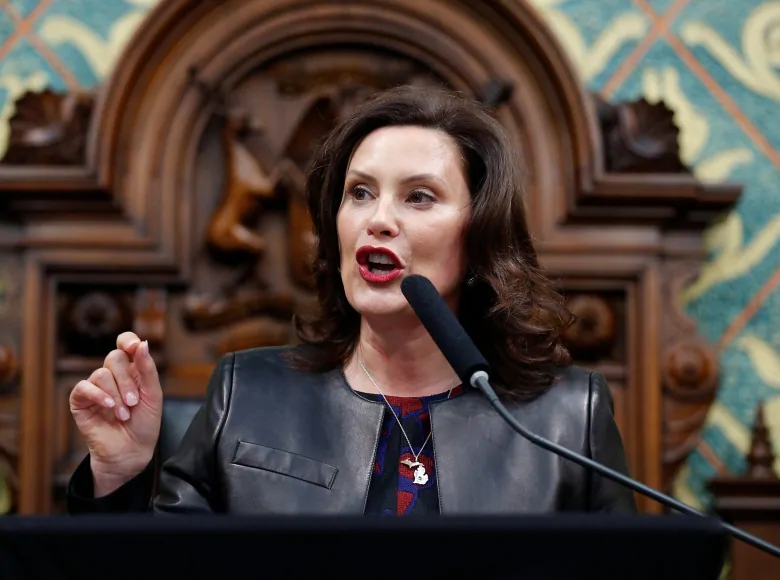Congress debates relief bill, McConnell suggests some states may be better off declaring bankruptcy

Michigan Gov. Gretchen Whitmer on Thursday blasted U.S. Senate Republican leader Mitch McConnell for his comments suggesting bankruptcy would be a better route for some states rather than federal aid, as money is doled out to help buffer an economy ravaged by the coronavirus pandemic.
“I was really disappointed to see Sen. McConnell’s comments about letting the states go bankrupt,” Whitmer said in an interview with MSNBC. “I just think that it’s incredibly irresponsible.”
The topic flared up as the U.S. House is expected to vote on Thursday on a fourth relief bill of nearly $500 billion US that passed the Senate earlier this week without including any funding for state and local governments. President Donald Trump said he will begin discussing more aid to state and local governments after he signs that bill into law.
McConnell, whose party controls the Senate, on Wednesday poured cold water on efforts by Democrats to tap federal coffers to provide assistance to state and local governments.
“I think this whole business of additional assistance for state and local governments needs to be thoroughly evaluated,” he said on Hugh Hewitt’s syndicated conservative talk radio show. “There’s not going to be any desire on the Republican side to bail out state pensions by borrowing money from future generations.”
Democrats push back on idea
Later, in an interview with Louisville, Ky.-based radio station WHAS, McConnell said Congress “may well” approve further aid, but that he would want it tightly tied to coronavirus-related costs.
Illinois Sen. Dick Durbin pointed out the stakes, as many municipal and state employees are those who are on the front lines of the pandemic battle.
Forcing states and localities into bankruptcy in the midst of this crisis would mean dire consequences for our schools, teachers, first responders, retirees, and the nation’s economy.
—@SenatorDurbin
Whitmer, who expressed hope that Democrats and the Trump administration could overcome objections from Republicans in Congress to providing aid, told MSNBC her state was facing a $3-billion hit to its budget this fiscal year and possibly even a bigger impact next year.
“It will undermine everything from public health to education if we don’t get the kind of support we need out of Washington, D.C.,” she said.
Other Democratic governors on Wednesday slammed the idea.
“Almost hoping for bankruptcy of American states amid the biggest health-care crisis this country has faced is utterly irresponsible,” New Jersey Gov. Phil Murphy said at a press conference.
A spokesperson for Illinois Gov. J.B. Pritzker said “every state is facing budget shortfalls and we need partners in Congress who will work with us on real solutions, instead of using this crisis to propose an ideological Hail Mary.”
Bankruptcy rules differ for states and cities
In a letter to Congressional leaders, the National Governors Association on Tuesday reiterated its call for an additional $500 billion to replace revenue lost by the states. The $2.3 trillion federal CARES Act allocated $150 billion to states and local governments exclusively to cover virus-related expenses.
Currently, states cannot file for bankruptcy, while cities and other local governments can use Chapter 9 municipal bankruptcy to restructure their debt if allowed by their states. Puerto Rico, a U.S. commonwealth, commenced a form of municipal bankruptcy in 2017 after the U.S. Congress authorized it.
With social distancing and stay-at-home orders in place around the nation aimed at slowing the virus’s spread, non-essential businesses and services have shuttered, leading to skyrocketing unemployment — a further 4.4 million claims were registered in Thursday’s report — and lower consumer spending. As a result, cities and states are starting to project deep revenue losses, particularly for big money generators like income and sales taxes.
The whole point is a red herring. [McConnell’s] statement is more about how Republicans are going to require concessions from Democrats if Democrats want states to get additional aid.– Market analyst
The IShares National Muni Bond Exchange Traded Fund traded lower after the news, but there was no immediate reaction in the $3.8-trillion U.S. municipal market, where states, cities and other issuers sell debt.
Municipal market analysts played down McConnell’s comments as political posturing. Matt Fabian, a partner at Municipal Market Analytics, said he doubted whether such a move was constitutionally or politically possible.
“The whole point is a red herring,” he said. “[McConnell’s] statement is more about how Republicans are going to require concessions from Democrats if Democrats want states to get additional aid.”
Hugh McGuirk, who oversees just under $30 billion in municipal bonds at T. Rowe Price, said bankruptcy should be an absolutely last resort for any government.
“I think, bankruptcy or not, that ultimately investors want a stable governmental entity providing the necessary services for its citizens,” he said.


